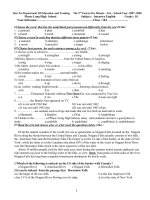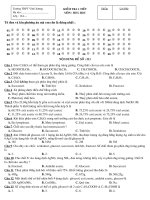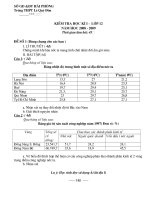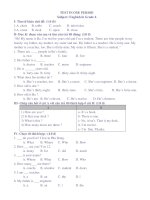KT 45 lần 1 Lớp 12 HKII
Bạn đang xem bản rút gọn của tài liệu. Xem và tải ngay bản đầy đủ của tài liệu tại đây (182.14 KB, 8 trang )
---------------------------------------------------------------------------------------------------------------------------------------
Question I: Read the following passage and answer the following questions. (1point)
National Parks
National park systems were started in the U.S. and Canada to protect places of great beauty, of scientific interest,
or with unusual plants or animals.
In 1872, the United States government passed a law naming Yell National Park, in Wyoming, as the first park to
belong to all the people in the country. It is an area with geysers, hot springs, waterfalls and lakes. A few years
later, Canada named Banff, in Alberta, its first national park. This park protects magnificent lakes, mountains, and
forests.
Both countries continued to add parks to their national park systems Lat some areas were named as national
parks because they contained remains of Indian societies. Other parks protect areas that were important in the
exploration and history of the two countries.
Even though the North of Canada did not develop as fast as the South, more and more people realised it was
important to save the large populations of wildlife before it was too late.
Today national parks protect scenic and historical areas from Hawaii to Newfoundland. The parks cover millions of
hectares in the mountains, the deserts, the forests, and along the coasts.
Other countries have developed national park systems, too. People everywhere in the world can enjoy the natural
beauty of their countries and know it is protected. And they know the parks will be there for the enjoyment of their
children's children.
1.What were national park systerms started in the U.S and Canada for?
-------------------------------------------------------------------------------------------------------------------------------------
2.When was the first national park in the United States?
--------------------------------------------------------------------------------------------------------------------------------------------
3.What does Canada's first national park. protect?
--------------------------------------------------------------------------------------------------------------------------------------
4.With national parks, What can people everywhere in the world do?
--------------------------------------------------------------------------------------------------------------------------------------
Question II: Circle the word or phrase among A, B, C or D that best fits the blank space in the following passage:
(1,25 points)
Books are written to provide knowledge and good books enrich the mind. By putting ourselves under the influence of
superior mind, we (1) --------- our mental powers. (2) ----------- good books, we learn that people everywhere are the same, in
all ages, and in all places. This knowledge improves our love (3) ------------ others and helps us to live in peace with them. We
also recognize that the world was made not only for man alone but for every creature that can feel hunger and thirst, warmth
and cold.
Though it may be possible for us to travel (4)----------- the world and see the things happening today, it is not possible for
us to see the things that happened in the past. But good books (5) ----------- us to see not only into the most remote regions of
the world today, but also into the world in which our ancestors lived.
1. A.set B.improve C.accelerate D.move
2. A.Through B.By C.On D.At
3. A.with B.of C.forward D.into
4. A.over B.throughout C.on D.through
5. A.help B.make C.let D.suggest
Question III: Circle the letter A, B, C, or D in the box to indicate the word whose underlined part is pronounced
differently from that of the rest. (1 point)
1. A. humans B. dreams C. concerts D. songs
2. A. communicates B. mistakes C. complains D. develops
3. A. worked B. stopped C. watched D. visited
4. A. peasant B. please C. reason D. ease
Question IV: Mark the letter A, B, C, or D in the box to indicate the correct answer to each of the following
questions. (1,5 points)
1.I haven’t heard from John ... last Christmas.
THPT ĐamRi
Họ và tên: ………………………….
Lớp: ………………………………..
BÀI KIỂM TRA VIẾT SỐ 3
Năm học 2008 – 2009 Môn: Tiếng Anh khối 12
Thời gian: 45 phút
(Lưu ý: Học sinh làm bài trực tiếp trên tờ đề)
Mã đề: A
Điểm:
A. for B. since C. until D. during
2.David leaned to play ... violin when he was at ... university.
A. the / Ø B. Ø / the C. Ø / Ø D. the / the
3.She doesn't understand ... I am saying.
A. what B. that C. whose D. where
4.-“Do you think they will come today?”
- “Well, they ... come today. But I think they’ll want to look around first.”
A. must B. needn’t C. might D. can’t
5.There is plenty of time for you to make up your mind. You --------- decide now.
A.mustn’t B.needn’t C.must D.may
6. Advertisers often say that their products are the best. ------- the real quality is not as good as it’s advertised.
A.Therefore B.So C.However D.As a result
Question V:
Mark the letter A, B, C, or D on your answer sheet to show the underlined part that needs
correction. (0.5 point)
1. Bill (A) is often late (B) for class, (C) which makes his teachers (D) angrily.
2.(A) In the end of the party, Mary found (B) herself (C) washing the dishes alone again, (D) as usual.
Question VI:
Complete each sentence with the correct form of the word given in capital. (1 point)
1.Endangered species are plant and animal species which are in danger of ---------. EXTINCT
2.In the north part of the desert, the dunes are paralleled and … by corridors of low,
open shrubland.
SEPARATION
3.The primary causes of species extinction are habitat … , commercial exploitation
and pollution.
DESTRUCTIVE
4.Different conservation efforts have been … in order to save endangered species. MAKING
Question VII:
Rewrite each sentence so that the meaning stays the same as the one given before it. (2,25
point)
1.We have decided to postpone the meeting because the lecturer hasn’t arrived yet.
The lecturer ------------------------------- so / therefore-------------------------------------------------------.
2.It isn’t necessary for him to come to the meeting so early.
He needn’t ----------------------------------------------------------------------------------------------------------------.
3.“I’m sorry I broke the glass”, said Peter.
Peter apologised -----------------------------------------------------------------------------------------------------------
4.That factory is producing more and more pollution.
More and more pollution------------------------------------------------------------------------------------------------.
5.I haven’t eaten this kind of food before.
This is the first------------------------------------------------------------------------------------------------------------.
6.The teacher is Mr. John. We studied with him last year.
The teacher----------------------------------------------------------------------------------------------------------------.
7.The accident happened because he drove the car too fast.
If he------------------------------------------------------------------------------------------------------------------------.
8.You mustn’t use this machine after 5.30 p.m.
This machine ------------------------------------------------------------------------------------------------------------
9.People think that many people were killed in the accident.
Many people --------------------------------------------------------------------------------------------------------------
Question VIII: Listening (1,5pts)
*Task 1: Listen and fill in the gaps in the passage. (1 point)
Australia is (1)------------in the southern hemisphere. It is the driest country on earth and is the only country
which (2)--------------- an entire continent. From north to south the distance is 3, 220 km and from east to west
(3)---------------- km. In area it is about the same size as the USA. Today about 85 % of the population of 18
million live in six major cities around the coast. (4)---------------------of the country is dry or desert.
*Task 2: Listen again and answer the question. (0,5 point)
1.How is the climate in the centre of Australia all the year round?
-----------------------------------------------------------------------------------------------------------------------------------
2.Does much of daily life happen outdoor?
-----------------------------------------------------------------------------------------------------------------------------------
ANSWERS
Question I: Read the following passage and answer the following questions.(1 point)
1. to protect places of great beauty, of scientific interest, or with unusual plants or animals.
2. In 1872
3.
It protects magnificent lakes, mountains, and forests.
4.They can enjoy the natural beauty of their countries and know it is protected.
Question II: Circle the word or phrase among A, B, C or D that best fits the blank space in the following passage:
(1,25 points)
1.B.improve 2.A.Through 3.B.of 4.B.throughout 5.A.help
Question III: Circle the letter A, B, C, or D in the box to indicate the word whose underlined part is pronounced
differently from that of the rest. (1 point)
1.C. concerts 2.C. complains 3.D. visited 4.A. peasant
Question IV: Circle the letter A, B, C, or D in the box to indicate the correct answer to each of the following
questions. (1,5 points)
1.B. since 2.A. the / Ø 3. A. what 4.C. might 5.B.needn’t 6.C.However
Question V:
Mark the letter A, B, C, or D on your answer sheet to show the underlined part that needs
correction. (0.5 point)
1. (D) angrily. 2. (A) In
Question VI:
Complete each sentence with the correct form of the word given in capital. (1 point)
1. extinction 2. separated 3. destruction 4. made
Question VII:
Rewrite each sentence so that the meaning stays the same as the one given before it. (2
point)
1.The lecturer hasn’t arrived yet so / therefore we have decided to postpone the meeting.
2.He needn’t come to the meeting so early.
3.Peter apologised for breaking / having broken the glass.
4.More and more pollution is being produced by that factory.
5.This is the first time I have eaten this kind of food.
6.The teacher with whom we studied last year is Mr. John.
Or: The teacher (whom/ that) we studied with last year is Mr. John.
7.If he hadn’t driven the car too fast, the accident wouldn’t have happened.
8.This machine mustn’t be used after 5.30 p.m.
9.Many people is thought to have been killed in the accident.
Question VIII: Listen and fill in the gaps in the passage. (1,5 points)
*Task 1: Listen and fill in the gaps in the passage. (1 point)
(1) located (2) covers (3) 3,860 km. (4)Two thirds
*Task 2: Listen again and answer the questions. (0,5 point)
1.The climate in the centre of Australia is hot and dry all the year round.
2.No, it does./ No, much of daily life happens indoor.
Tapescript
Australia is located in the southern hemisphere. It is the driest country on earth and is the only country which
covers an entire continent. From north to south the distance is 3, 220 km and from east to west 3,860 km. In area it
is about the same size as the USA. Today about 85 % of the population of 18 million live in six major cities
around the coast. Two thirds of the country is dry or desert.
The climate is different depending on area. The south has cool, wet winters and warm, dry summers. The
north has warm, dry winters and hot, wet summers. The centre of Australia is hot and dry all the year round.
Because of such a climate, much of daily life happens indoor.
Supply the correct tense of the verb in the brackets (1 point)
Yesterday she (33) (tell) me the story of how she (34) (forget) her passport last August. She (35) (wait) in the
queue at the passport control when she (36) (realized) that she (37) (leave) her passport at home. She hurried to
phone and rang her parents who (38) (work) in the garden, but luckily her mother (39) (hear) the phone. They
found the passport and immediately (40) (drive) to the airport with it.
33. told 34. forgot 35. was waiting 36. realized
37. had left 38. were working 39. heard 40. drove
Rewrite each sentence so that the meaning stays the same as the one given before it. (1 point)
1. We have decided to postpone the meeting because the lecturer hasn’t arrived yet.
The lecturer
……………………………………………………………………………………………………
2. It isn’t necessary for him to come to the meeting so early.
He ................................................................................................................................................................
3. “I’m sorry I broke the glass”, said Peter.
Peter apologised .........................................................................................................................................
4. This factory is producing more and more pollution.
More ............................................................................................................................................................
Complete each sentence with the correct form of the word given in capital. (1 point)
5. Developments in micro technology-computers and … are bound to have a huge
influence on various aspects of our lives.
TELECOM
6. In the north part of the desert, the dunes are paralleled and … by corridors of low,
open shrubland.
SEPARATION
7. The primary causes of species extinction are habitat … , commercial exploitation
and pollution.
DESTRUCTIVE
8. Different conservation efforts have been … in order to save endangered species. MAKING
24. 25. 26. 27.
Listen to Tom talking to a friend about a sports afternoon. What sport did each person do? (2.5 points)
9. Sam
10. Jane
11. Paul
12. Susan
13. Ann
A. basket ball
B. football
C. golf
D. horse-
riding
E. skiing
F. table-tennis
G. tennis
H. volley ball
28. 29. 30. 31. 32.
Supply the correct tense of the verb in the brackets (1 point)
Yesterday she (33) (tell) me the story of how she (34) (forget) her passport last August. She (35) (wait) in the
queue at the passport control when she (36) (realized) that she (37) (leave) her passport at home. She hurried to
phone and rang her parents who (38) (work) in the garden, but luckily her mother (39) (hear) the phone. They
found the passport and immediately (40) (drive) to the airport with it.
33. 34. 35. 36.









